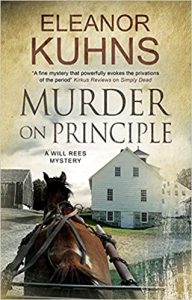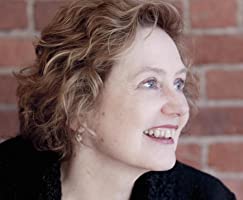Launch: Eleanor Kuhns’s Murder on Principle
INTERVIEW BY DAVID CONNON
Award-winning writer Eleanor Kuhns recently published Murder on Principle, the tenth book in her series of 19th century murder mysteries.
 What is your elevator pitch?
What is your elevator pitch?
Rees and Lydia escort enslaved persons to the North. Their owner arrives in town to recapture his property and is murdered. Who murdered him and why? Considering that the murderer is probably an escaped slave, should Rees even try to identify him?
How did you become interested in writing historical fiction murder mysteries?
I’ve always loved historical fiction. The technology changes but people are always the same, aren’t they? And sometimes one decision can alter subsequent events in such major ways. I enjoy writing murder mysteries because murder is taboo in almost every society and yet we continue to murder one another. I’m always fascinated by the why.
Have any authors influenced you as a writer?
I loved Rosemary Sutcliff as a child. Two of my favorites now are Barbara Hambly and Anne Perry. Probably my favorite book, and one I read every year, is the Doomsday Book by Connie Willis.
What is your occupational background and how does that affect your writing?
I have worked in libraries in New York and Maine. I started at age sixteen as a page, putting away books, and did not leave until March 2019 with the beginning of the pandemic. At that time, I transitioned to full-time writing, alternating with the remote schooling of my grandchildren. I have always wanted to be a writer and wrote my first novel, a fantasy story, at the age of ten. I switched to mysteries and published my first, A Simple Murder, in 2011, winning the Minotaur/Mystery Writers of America First Crime Novel prize. Murder on Principle is my tenth Will Rees novel.
As a reference librarian, research is the name of the game and several of my libraries had local history rooms. I love the opportunity for primary research. Plus, frequently, there are old maps, photos of old historical buildings (many of which no longer exist), and sometimes even old letters and other artifacts such as clothing.
How do you strike a balance between too much research and the right amount?
This is a tough question since I struggle all the time. Sometimes I go down a rabbit hole and spend weeks on a fascinating topic, only to have it show up as one thin paragraph in the finished book. But I console myself with the thought that, when one is doing the research, one never knows what will be important.
Murder on Principle is set in 1800 in the new state of Maine. It was a time of horse-drawn wagons, back-breaking farm work, and no electricity. Leading character Will Rees is a weaver and unwilling farmer. Do you have a farming heritage or personal experience with cows and horses? And why did you pick this period for the Will Rees series?
I grew up on a farm in Pocatello, Idaho, until I turned seven. My father was a reluctant farmer. We owned only one horse but also a mule, chickens, cattle, sheep, rabbits and more. I learned to milk a cow when I was five. I’ve churned butter, brought in the hay (an awful job), canned, and more. One of my hobbies is handweaving, so I have several looms and can describe the process accurately.
So many historical mysteries are set in and around wartime. I understand why. There was so much emotion and so many complicated issues with that period. But I didn’t want to write about war. I felt this 19th century time period and topic has been underexplored.
Your portrayal of former slaves – temporarily free in Maine – and two actively hunted fugitive slaves has the ring of truth. Those individuals have voices, personalities, and relationships with townspeople. Did you draw upon any testimonies of former slaves?
I read a lot of autobiographies of the escaped people. For the previous book, Death in the Great Dismal, I visited the swamp and saw what the fugitives were willing to endure for freedom. What struck me, overall, was the almost constant fear experienced by these people. And still, they persisted.
When you consider introducing a moral dilemma, what factors do you try to include?
I don’t find the world black and white but more like shades of gray. A lot of decisions are difficult because of all those shades. Rees especially struggles because of his attachment to family and friends, his moral compass, and his concern about future consequences. I try to add the pros and cons of his decisions and describe Rees’s efforts to make the best decision. And I note when he does not succeed.
Did you envision the first Will Rees book turning into a series of ten books (and counting)?
No. I am constantly amazed that I have now written as many of them as I have. But all the characters are now real people to me.
Have any of your characters matured or grown in complexity in later books?
Once I realized this would be a series, I thought about Will Rees. He is a little selfish and self-absorbed in the first book, but I hope I have shown him growing and changing throughout. The children have all changed and the older ones especially now have their own lives. Even some of the side characters, such as Constable Rouge, have changed since my first imagining, as outside events force reckonings. It has been surprising to me how much some of the ancillary characters have taken on personalities and lives of their own.
 What has been the biggest surprise about the process of writing historical fiction?
What has been the biggest surprise about the process of writing historical fiction?
How much we do not know about our own history. I am always finding tidbits in my research that astonishes me. In many ways, this has been a real journey for me as well as for my characters.
Do you have any tips for mystery writers on creating red herrings?
I usually start with several possible murderers and add clues that could point to each one in turn. I almost never know myself who I will choose in the end. And I rewrite obsessively.
What is your next project and how far advanced is it?
The book that follows Murder on Principle is Murder, Sweet Murder, and it is already with the publisher. I am working on the one after that, titled The Long Shadow. It is almost complete.
What is the last good book you have read?
I read two or three books a week. The most recent was Death in Daylesford by Kerry Greenwood.
![]()
HNS Sponsored Author Interviews are paid for by authors or their publishers. Interviews are commissioned by HNS.






